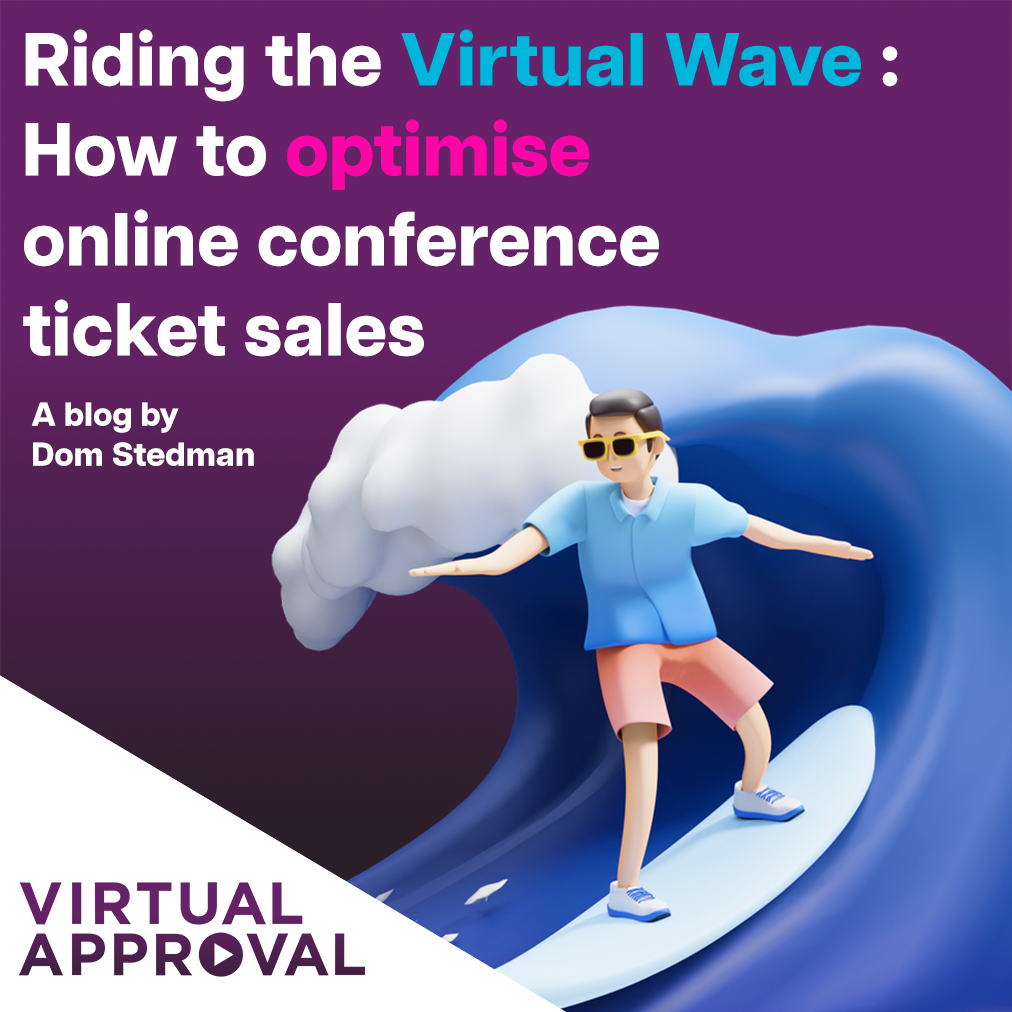
13 July 2023
Riding the Virtual Wave: How to Smash Online Conference Ticket Sales

Pre warning:
As we bask in the summer heat, we find ourselves thinking of the sea side, ice creams, beach balls and surfing! Hence, you might notice a sprinkle of beach and surfing puns throughout this blog on enhancing your online conference ticket sales (for which we pre-emptively say, “sorry, we couldn’t resist!”).

Let’s dive in
In an era where approximately 4.88 billion people globally are surfing the internet on a ‘free’ wave. It may seem paradoxical that people continue to dive into their pockets to purchase virtual event tickets for online conferences. This poses a gnarly question: Why would someone decide to catch the surf early and buy a ticket? When they could potentially wait for the tide to bring in the content freely online?
We believe that there are four principal factors that ‘hang ten’ in the world of online conference ticket sales.
1. Perceived Value: The balance quality vs exclusivity to enhance your ticket sales
In a survey conducted by EventMB, 63% of attendees reported that the quality of the content was the main swell pushing their ticket purchase. A lineup of reputable speakers or panellists that makes a big splash, timely and impactful topics, and high production values have proven to create quite a rip in ticket sales. Notably, exclusive content remains a powerful undertow. Some conferences drop select sessions or keynotes for free. Then they reserve the more complex, in-depth workshops, breakout sessions, or bonus material for ticket holders only. According to Digitell, a whopping 80% of consumers said they would pay for exclusive content if it provides a unique perspective or learning opportunity.

2. Networking Opportunities: Catching the Wave of Interactions
While the information at a conference is often the main break, networking rides a close second. 59% of attendees surveyed by the Bizzabo Event Success Platform stated that networking was a crucial factor in their decision to purchase online conference tickets. Furthermore, 85% of professionals agree that both face-to-face interactions and virtual networking spaces are key to forging long-term business relationships (HubSpot, 2020). Online platforms are now finding innovative ways to facilitate networking opportunities that mimic the in-person experience. These include virtual lobbies for group discussions, one-on-one video calls, and even AI-powered matchmaking for business interactions.
3. Real-Time Engagement: The Thrill of the Live Ride vs. Recorded Sessions
Your online conference isn’t just about the static content; it’s about delivering real-time engagement. According to an Adobe webinar report, 91% of webinar attendees prefer live webinars, signifying that real-time engagement is vital for a successful virtual event. Live sessions can provide a range of features: live Q&As, interactive polls, real-time reactions, green rooms, and more. These features create a dynamic where attendees can engage directly with speakers and fellow attendees – an experience often not available with the later, freely available recorded versions.

4. Supporting the Cause or Organisation: Riding for a Reason
Often, people purchase virtual event tickets not just for the event itself. They actually buy the ticket to support the cause or organisation behind it. According to a study by Cone Communications, 91% of global consumers are likely to switch brands to one associated with a good cause, as long as it has comparable price and quality. A well-executed marketing campaign in the run-up to the event can give potential audiences an insight into the organisation. Allowing them to develop brand loyalty and support. Timely announcements of speakers and planned workshops with designated hashtags and calls to action can encourage potential attendees to share their attendance across their social networks. This organic spreading of the word about your event can lead to better opportunities for lead generation.
Let’s Review
In essence, the decision to purchase a ticket for an online conference is multifaceted, grounded in perceived value, networking opportunities, real-time engagement, and support for the cause or organisation. As the world of virtual events continues to evolve like an ever-changing sea, understanding these drivers is key for event organisers aiming to maximise both their online conference ticket sales and attendees’ satisfaction.
Finally, if our surfing puns had you feeling a bit “wiped out”, we promise to “reel it in” next time. Thanks for “riding” this wave with us!
Want to read more of our blogs – check out https://virtualapproval.com/blog/
Here’s our sources
- “Number of internet users worldwide from 2005 to 2019” – Statista, 2019. (https://www.statista.com/statistics/273018/number-of-internet-users-worldwide/)
- “Attendee expectations: what your attendees expect from your event” – EventMB, 2018. (https://www.eventmanagerblog.com/attendee-expectations-report)
- “Why Consumers Pay for Content” – Digitell, 2020. (https://digitellinc.com/blog/why-consumers-pay-for-content/)
- “Why Networking is Important” – HubSpot, 2020. (https://blog.hubspot.com/sales/why-networking-in-sales-is-important)
- “2017 Webinar Benchmarks Report” – Adobe, 2017. (https://www.adobe.com/content/dam/acom/en/data/pdfs/8933.Adobe_Connect_Webinar_Benchmark_Report_Final.PDF)
- “Cone Communications CSR Study” – Cone Communications, 2017. (https://www.conecomm.com/research-blog/2017-csr-study)
- “Virtual Events Market Size, Share & Trends Analysis Report By Type, By Services, By Source, By Application, By Regions, And Segment Forecasts, 2021 – 2028” – Grand View Research, 2021. (https://www.grandviewresearch.com/industry-analysis/virtual-events-market)
































